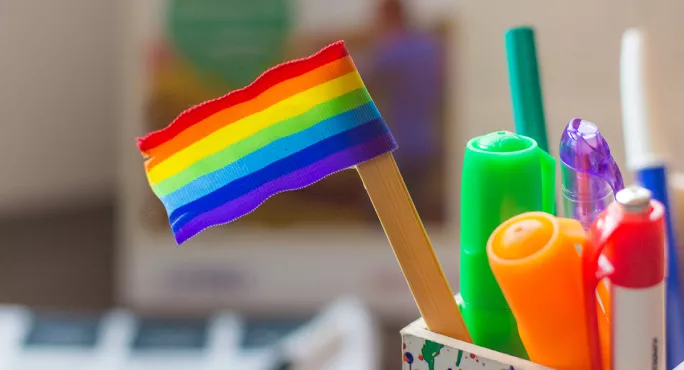- Home
- ‘We must keep fighting for LGBT support’
‘We must keep fighting for LGBT support’

For 15 years, teachers in this country were not allowed to say “it’s OK to be gay”. This month, just 30 years ago, the UK parliament enacted the legislation that brought this about. Section 28 of the Local Government Act 1988 was homophobia writ into law. It grew out of public fear about the then-new HIV/AIDS pandemic, stoked by scare stories of left-wing councils allegedly "promoting homosexuality" to young people. It’s extraordinary to the modern eye that such an illiberal law lasted until 2003.
The issue came to a head when the government ordered the Crown Prosecution Service to prosecute the publishers of The Playbook For Kids About Sex, which mentioned issues such as homosexuality and masturbation. The CPS decided that it could not, under current law, make a prosecution and this pushed the issue to become a significant Conservative priority in the run-up to the 1987 general election.
Despite significant opposition from those who were afraid of the effects of the new law, it was finally enacted on the 24 May 1988. Its subsequent impact was amplified by the confusion about where it applied. The law said that local authorities "shall not intentionally promote homosexuality or publish material with the intention of promoting homosexuality" or "promote the teaching in any maintained school of the acceptability of homosexuality as a pretended family relationship". Despite clarification from the Department of Education and Science that it should not prevent the discussion of homosexuality in the classroom, the majority of the profession did not want to become targets of the tabloids and it created a background in which schools became fearful of directly confronting homophobic bullying or helping confused and anxious teenagers come to terms with their sexuality.
'Suicides could have been prevented'
I discovered recently that one of my school teachers in the 80s and 90s was gay but wasn’t able to say so. As a gay teenager, it would have been incredibly powerful to know that there was someone I could speak to. As it was, I and many other young people instead received the message that "your sexuality is so unpleasant that we must not speak about it". With nobody challenging the frequent use of the word "gay" as an insult – indeed, with some teachers using it themselves – the environment was toxic. No wonder, perhaps, that young LGBT people had massively higher rates of mental ill-health, self-harm and even suicide.
Honestly, it still makes me seethe with anger. As much as I can understand why a lack of education and political fear-mongering brought this legislation about, the legacy of its damage still lives with us. There is a whole generation of young people who were denied by law the support they needed. There are suicides that could have been prevented, there are adults who still struggle with the damage that was so preventable during their childhood.
Of course, we’ve come an incredibly long way. The Blair government attempted to repeal the law in 2000 but was blocked by the House of Lords. Finally, in 2003, after the legislation had been almost entirely superseded by new laws, Parliament managed the highly symbolic repeal of this awful section of the 1988 Act. Since then we’ve moved to a different world, having same-sex marriage as a right and the Gender Recognition Act. We have government’s vocal support for LGBT issues in schools and a Conservative prime minister who supports further modernisation of the Gender Recognition Act.
What an amazing and symbolic moment it was in 2017 to have two openly gay politicians in charge of education policy, with Justine Greening and Nick Gibb as secretary of state and schools minister, respectively. Indeed, Nick Gibb has volunteered to speak at the launch of the new LGBTed network, a place for LGBT educators to support each other to be the visible LGBT role models that we all needed when we were children.
And yet, there’s still no place for complacency. Stonewall’s 2017 research shows two in five LGBT students – 40 per cent – are still never taught anything about LGBT issues at schools and only one in five is ever taught about safe sex in same-sex relationships. Almost half of all LGBT pupils still face bullying at school for being LGBT, and more than two in five trans young people have tried to take their own life. There is still terrible prejudice about gender identity, with hysteria being whipped up in the name of protecting children.
Section 28 is gone, but it is not forgotten. The law is a symbol of how protecting the safety, health and happiness of young LGBT people is not always a one-way street and rights can be removed as well as given. We cannot, we must not, we will not stop campaigning.
David Weston is CEO of the Teacher Development Trust, founder of OutTeacher (now part of LGBTed) and was chair of the DfE Teachers’ Professional Development Expert Group. Follow him on Twitter at @informed_edu
Register with Tes and you can read two free articles every month plus you'll have access to our range of award-winning newsletters.
Keep reading with our special offer!
You’ve reached your limit of free articles this month.
- Unlimited access to all Tes magazine content
- Save your favourite articles and gift them to your colleagues
- Exclusive subscriber-only stories
- Over 200,000 archived articles
- Unlimited access to all Tes magazine content
- Save your favourite articles and gift them to your colleagues
- Exclusive subscriber-only stories
- Over 200,000 archived articles



